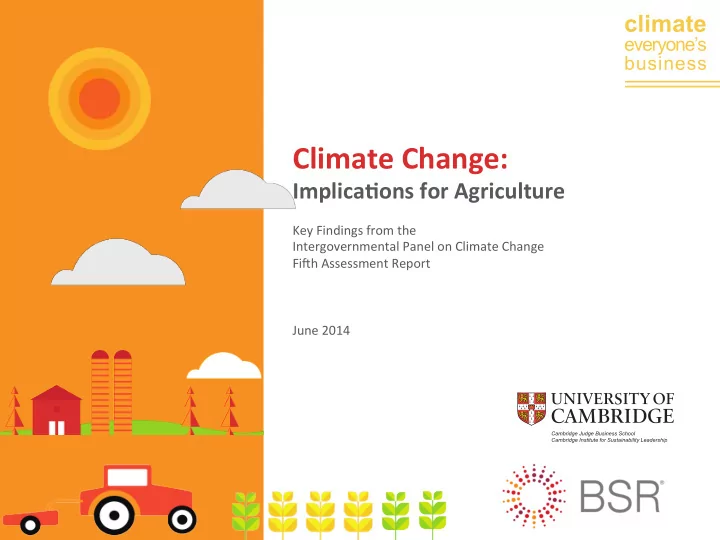

climate everyone’s business Climate ¡Change: ¡ ¡ Implica0ons ¡for ¡Agriculture ¡ ¡ Key ¡Findings ¡from ¡the ¡ ¡ Intergovernmental ¡Panel ¡on ¡Climate ¡Change ¡ Fi7h ¡Assessment ¡Report ¡ ¡ ¡ ¡ June ¡2014 ¡
climate everyone’s Climate ¡Change: ¡ Key ¡Findings ¡ business Climate ¡change ¡impacts ¡are ¡projected ¡to ¡ raise ¡global ¡average ¡surface ¡temperature ¡ 2.6–4.8 o C ¡by ¡2100. ¡ ¡ Climate-‑related ¡impacts ¡are ¡already ¡ reducing ¡crop ¡yields ¡in ¡some ¡parts ¡of ¡the ¡ world, ¡a ¡trend ¡that ¡is ¡projected ¡to ¡conKnue ¡ as ¡temperatures ¡rise ¡further. ¡ ¡ Combined ¡with ¡increasing ¡food ¡demand, ¡ global ¡temperature ¡increases ¡of ¡4 o C ¡or ¡more ¡ would ¡pose ¡large ¡risks ¡to ¡food ¡security ¡ Staple ¡crops ¡ affected ¡include : ¡ § Wheat ¡ globally ¡and ¡regionally. ¡ § Maize ¡ § Rice ¡
climate everyone’s Climate ¡Change: ¡ Key ¡Findings ¡ business Greenhouse ¡gas ¡(GHG) ¡emissions ¡from ¡agriculture ¡ comprised ¡about ¡10–12% ¡of ¡man-‑made ¡GHG ¡emissions ¡ in ¡2010. ¡ ¡ The ¡agricultural ¡sector ¡is ¡the ¡largest ¡contributor ¡of ¡ ¡ non-‑carbon ¡ GHGs, ¡such ¡as ¡methane. ¡ ¡ ¡ If ¡temperatures ¡increase ¡by ¡3 o C ¡or ¡more, ¡agricultural ¡ adapKve ¡capacity ¡is ¡projected ¡to ¡be ¡exceeded ¡in ¡regions ¡ closest ¡to ¡the ¡equator. ¡ ¡ The ¡agricultural ¡sector ¡has ¡ significant ¡ poten0al ¡ to ¡make ¡cuts ¡in ¡GHG ¡ emissions. ¡
climate everyone’s Climate ¡Change: ¡ Key ¡Findings ¡ business OpportuniKes ¡for ¡miKgaKon ¡include: ¡ ¡ § Reducing ¡emissions ¡from ¡land ¡use ¡change ¡ § Land ¡management ¡ § Livestock ¡management ¡ ¡ ¡ Capture ¡and ¡storage ¡of ¡carbon ¡in ¡soil ¡and ¡ biomass. ¡ ¡ Economy-‑wide ¡emissions ¡from ¡energy ¡use ¡can ¡be ¡ reduced, ¡under ¡certain ¡condiKons, ¡by ¡replacing ¡ fossil ¡fuels ¡with ¡biofuels. ¡
climate everyone’s Climate ¡Change: ¡ Key ¡Findings ¡ business The ¡potenKal ¡for ¡reducing ¡GHG ¡emissions ¡from ¡ agriculture ¡through ¡changes ¡in ¡consumpKon ¡ could ¡be ¡substanKally ¡higher ¡than ¡technical ¡ miKgaKon ¡opKons. ¡ ¡ Approaches ¡include: ¡ § Reducing ¡food ¡waste ¡ § Reducing ¡overconsumpKon ¡in ¡regions ¡ where ¡this ¡is ¡prevalent ¡ § Changing ¡diets ¡towards ¡less ¡GHG-‑ intensive ¡food ¡(e.g. ¡subsKtuKon ¡of ¡ animal ¡products ¡with ¡plant-‑based ¡food) ¡ Farmers ¡can ¡adapt ¡to ¡some ¡changes, ¡ but ¡ there ¡is ¡a ¡limit ¡to ¡what ¡can ¡be ¡ managed . ¡
climate everyone’s Climate ¡Change: ¡ Key ¡Findings ¡ business Climate ¡change ¡is ¡projected ¡to: ¡ § Increase ¡price ¡volaKlity ¡for ¡agricultural ¡ commodiKes ¡ § Reduce ¡food ¡quality ¡ ¡ Overall, ¡climate ¡change ¡is ¡projected ¡to ¡cause ¡ food ¡producKon ¡to ¡fall, ¡with ¡lower ¡yields ¡from ¡ major ¡crops. ¡ ¡ ¡ These ¡projected ¡impacts ¡will ¡occur ¡in ¡the ¡ context ¡of ¡simultaneously ¡rising ¡crop ¡demand. ¡ ¡ ¡ The ¡agricultural ¡industry’s ¡own ¡interests ¡are ¡ best ¡served ¡by ¡ambiKous ¡approaches ¡to ¡ adaptaKon ¡and ¡to ¡cu_ng ¡emissions. ¡ ¡
For ¡more ¡informa0on ¡ ¡ Cambridge ¡InsKtute ¡for ¡Sustainability ¡Leadership ¡ ipcc@cisl.cam.ac.uk ¡ ¡ Edward ¡Cameron, ¡BSR ¡ ecameron@bsr.org ¡ ¡ ¡ European ¡Climate ¡FoundaKon ¡ AR5@europeanclimate.org ¡ ¡ www.cisl.cam.ac.uk/ipcc ¡ www.bsr.org ¡ www.europeanclimate.org ¡
Recommend
More recommend